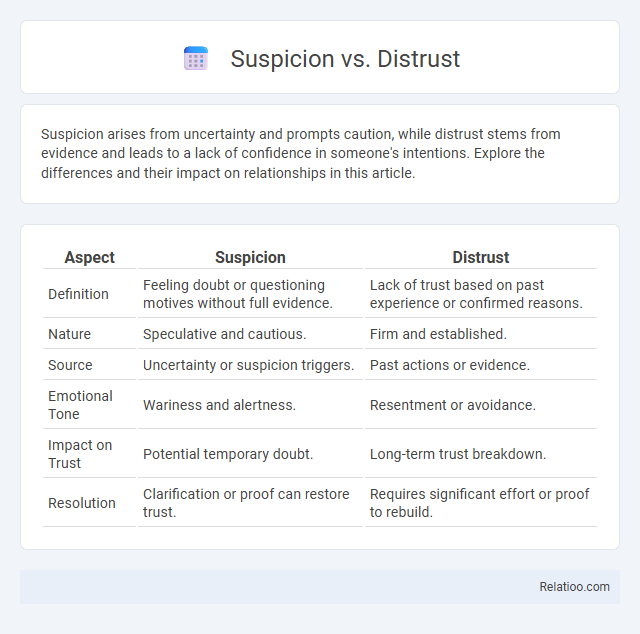Suspicion arises from uncertainty and prompts caution, while distrust stems from evidence and leads to a lack of confidence in someone's intentions. Explore the differences and their impact on relationships in this article.
Table of Comparison
| Aspect | Suspicion | Distrust |
|---|---|---|
| Definition | Feeling doubt or questioning motives without full evidence. | Lack of trust based on past experience or confirmed reasons. |
| Nature | Speculative and cautious. | Firm and established. |
| Source | Uncertainty or suspicion triggers. | Past actions or evidence. |
| Emotional Tone | Wariness and alertness. | Resentment or avoidance. |
| Impact on Trust | Potential temporary doubt. | Long-term trust breakdown. |
| Resolution | Clarification or proof can restore trust. | Requires significant effort or proof to rebuild. |
Understanding Suspicion and Distrust
Suspicion involves a feeling of doubt or wariness about someone's intentions, often based on incomplete evidence or intuition, whereas distrust is a firmly established belief that someone is untrustworthy, grounded in past experiences or concrete reasons. Understanding suspicion requires recognizing its role as a cautious alert that prompts further inquiry, while distrust reflects a deeper emotional judgment that can hinder relationships. Differentiating these concepts helps in navigating social interactions, allowing for more accurate assessments of trustworthiness and risk.
Defining Suspicion: Key Characteristics
Suspicion involves doubt or mistrust based on incomplete or circumstantial evidence, triggering cautious awareness and vigilance. Unlike distrust, which is a firm belief in untrustworthiness, suspicion prompts inquiry and assessment rather than outright rejection. Your ability to recognize these key characteristics helps differentiate suspicion from more definitive forms of distrust, enhancing decision-making in uncertain situations.
What Sets Distrust Apart?
Distrust sets itself apart by implying a deeper, more entrenched lack of confidence in someone's intentions or reliability, often stemming from past experiences or evidence. While suspicion denotes uncertainty or doubt that something might be wrong, distrust reflects a conscious decision to withhold trust due to perceived risk or betrayal. This differentiation is key in psychology and interpersonal relationships, where distrust can lead to more significant barriers in communication and cooperation than suspicion alone.
Psychological Roots of Suspicion
Suspicion stems from an innate psychological mechanism designed to protect Your well-being by detecting potential threats or deception, often triggered by ambiguity or inconsistent behavior. Unlike distrust, which is a conscious decision based on reliable evidence or past experiences, suspicion operates more subconsciously and can lead to both accurate and erroneous judgments. Understanding these psychological roots helps differentiate suspicion as an adaptive cognitive response, distinct from the more deliberate evaluative processes behind distrust.
Origins and Causes of Distrust
Suspicion arises from a sense of doubt or uncertainty about someone's intentions, often triggered by ambiguous behavior or incomplete information. Distrust stems from repeated negative experiences or evidence indicating unreliability, creating a deep-seated belief that others are likely to act harmfully or deceitfully. Unlike suspicion's initial caution, distrust originates from accumulated breaches of trust, betrayal, or inconsistency in actions that undermine confidence and foster skepticism.
Suspicion in Daily Life Scenarios
Suspicion in daily life often arises when Your intuition detects inconsistencies or unusual behavior, prompting caution before trust is established. Unlike distrust, which implies a definitive lack of trust, suspicion serves as an alert to potential risk or deception, encouraging further observation and verification. This subtle difference helps You navigate social interactions more prudently by balancing open-mindedness with careful scrutiny.
The Impact of Distrust on Relationships
Distrust deeply undermines relationships by eroding the foundation of trust essential for effective communication and emotional connection. Your ability to foster collaboration and mutual respect diminishes when suspicion or distrust clouds interactions, often leading to increased conflict and reduced cooperation. Persistent distrust can cause long-term damage, making it difficult to rebuild rapport or restore confidence between individuals.
Comparing Effects: Suspicion vs. Distrust
Suspicion triggers a cautious mindset, prompting you to seek evidence or clarification before forming judgments, often leading to thoughtful investigation. Distrust, on the other hand, fosters a firm lack of confidence that can result in avoidance or defensive behavior, impairing relationships and collaboration. While suspicion may encourage critical thinking, distrust tends to erode communication and trust-building efforts.
Overcoming Suspicion and Building Trust
Overcoming suspicion involves addressing uncertainty through transparent communication and consistent actions that demonstrate reliability. Building trust requires fostering positive experiences over time, reinforcing confidence in intentions and capabilities. Employing empathy and openness helps bridge gaps created by distrust, transforming suspicion into cooperative relationships.
Promoting Healthy Relationships through Trust
Understanding the distinctions between suspicion, distrust, and trust is crucial for promoting healthy relationships, as suspicion often arises from uncertainty and can erode your confidence in others prematurely. Distrust involves a deeper skepticism based on past experiences, making it harder to rebuild connection without intentional communication and transparency. Cultivating trust requires consistent honesty, empathy, and reliability, forming a strong foundation for lasting emotional bonds and mutual respect.

Infographic: Suspicion vs Distrust
 relatioo.com
relatioo.com